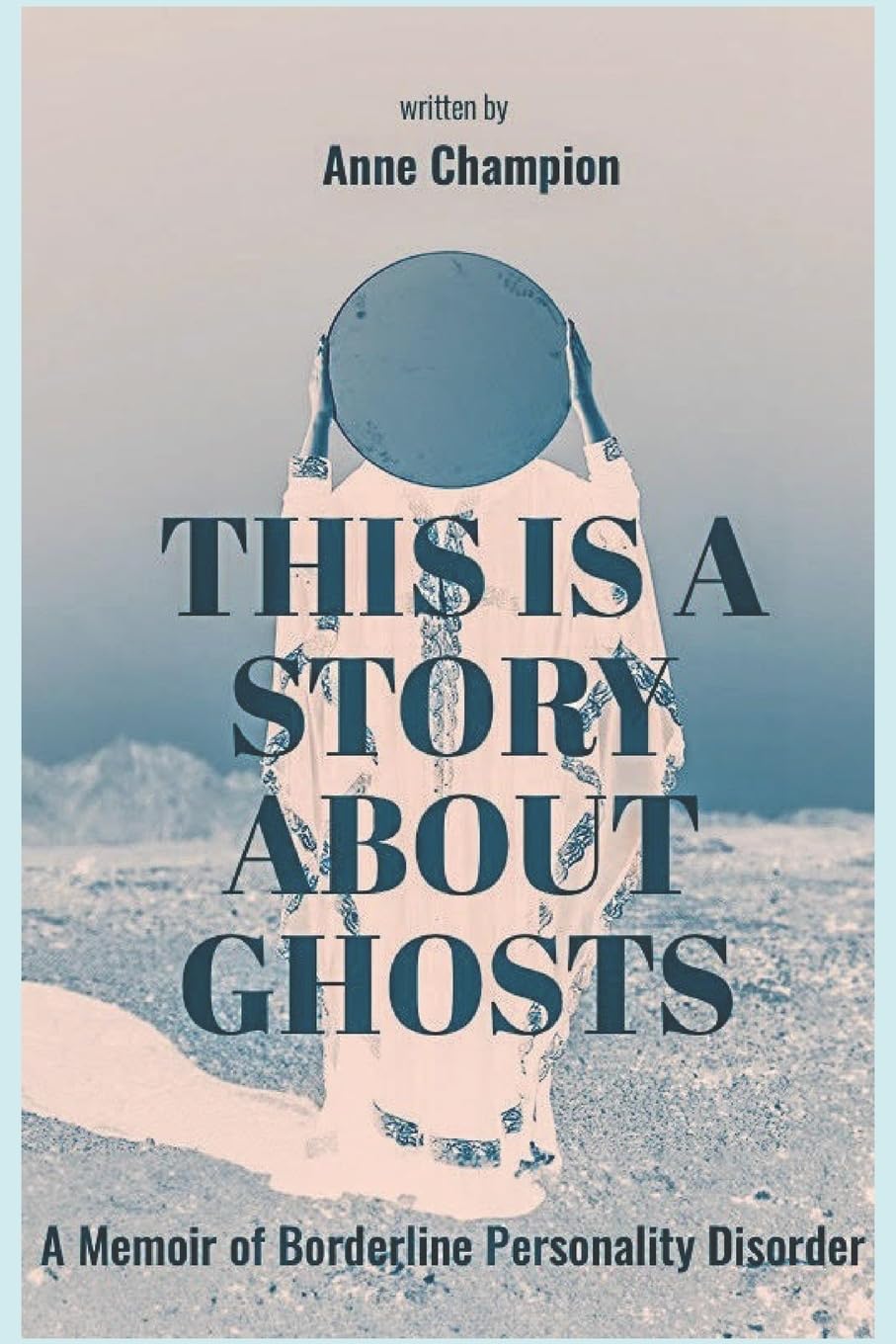I love memoirs. I also try to gobble up every new or important book about psychology. This is a Story About Ghosts is subtitled, “A Memoir of Borderline Personality Disorder.” At the end it discusses Cluster B Personality Disorders (Narcissist, Borderline, Histrionic and Anti-social).
The author of this memoir, Anne Champion, is also a published poet and a creative writing teacher. Her use of description, language and metaphor is poetic. The ghosts are the people from her past who left her life for one reason or another. This book is hard to put down!
While I won’t argue with the author’s self-assessment or her therapist, I disagree that the pain and suffering experienced by her and others had anything to do with the “patriarchy.” The first three people in her life who died under tragic circumstances — C.D., Logan and Beaux — were males. C.D., whose father was in jail and whose mother abandoned him, was raised by his grandmother who died when he was a teen. The person who caused her early life pain was not her father, but her mother. Maternal cruelty can cause trauma, but it is not a result of the patriarchy.
An intense and interesting life
While many memoirs exaggerate, and this may be no different, I love the fact that Anne Champion lived an intense life. Trying to find love in all the wrong places is characteristic of many women with Borderline Personality Disorder. They’re perfect fodder for those with Narcissistic Personality Disorder. The author abused drugs, but sex was her primary drug. Sometimes it’s hard to keep all the different men who came into her life straight. She frequently used bad judgment and failed to learn lessons quickly.
When she ended relationships with many of the men, they became her stalkers. But why did she keep attracting that type who could not let go? She was even “friends” with a guy who installed wiretaps on her apartment. Anne was raped several times. But, was this because of patriarchy, or because of her lack of boundaries and mixed signals? Champion describes with clarity and insight what feeds the narcissists’ wounds. I sympathize with her but certainly wish she had gone into therapy sooner. I also think that many things she calls misogyny are deep character flaws, based on the perpetrators’ wounds, not hatred of her or women.
This memoir is written elegantly. Champion’s description of trauma bonding is profound. No part of the book can be reproduced; otherwise, I would repeat some of her beautiful lines. If you like memoirs, this one is powerful!
Is the United States still a Patriarchy?
The election of Donald Trump as president in 2024 may signify to some that patriarchy is still alive and well in the USA. Kamala Harris lost for many reasons, but misogyny was not one of them. Those who felt left out of the system for years elected Donald Trump the first time around. When he won the second time, minorities and young voters came to his side in greater numbers.
Many people in the US are broken — broken by poverty, addiction all kinds of tragedy. Life is hard for most people. Some Americans have a huge attraction to guns, military might and other symbols of power. But these people are not most Americans, and they’re not the ones with the greatest influence.
Our patriarchal culture took a nosedive in the 1960s and it dove even further down in the 21st century. While most men born in the 1920s grew up with patriarchal attitudes, few of them are still alive. Sandwiched between two world wars, they experienced the Great Depression and knew great hardship. If you couldn’t be “man enough,” you’d drowned. There was an urgent need to lead and protect. Baby boomers learned some of these traits and got discipline from these dads, but they also let go of much in a patriarchal system. Anne’s father held onto remnants of it, but not in a big way.
I think the author, a millennial, is mistaken to see our world today as patriarchal. The ultimate libertarian cynic, Bill Maher, recently called out today’s fathers for coddling their children and He wants to bring back the Trad Dad (traditional). https://www.yahoo.com/entertainment/bill-maher-wants-trad-dads-133000130.html
Maher seems to think were we’re creating little tyrants and dictators. No wonder adults aren’t respected as a whole by the younger generations. And young adults are cutting ties with their families, often without good reason.
More college students are female than male.
Exposing higher education system
Champion is an activist for a litany of causes dealing with human rights around the world.
Champion’s claims about patriarchy expose truths about the higher education system, of which she is a part. While colleges celebrate ethnic diversity, they often do not tolerate diversity of opinions. Furthermore, white, heterosexual males are rarely considered for the higher echelons of employment at universities, for fear they would force racial and sexual supremacy. More college students are female than male.
The universities that educated our teachers have changed the elementary schools, too. Schools today push the girls at the expense of the boys and elementary schools emphasize building self-confidence. There’s little deference to the experience of those who came before. No wonder mothers and older women are not respected as they were in the past.
Champion calls out the form of racism she grew up with in the Midwest during 1990s. She tells in the tragic story of her dear friend Beaux, who was killed by his alcoholic stepfather. Yet the journalist reporting it treated him like a stereotype, as if all black youths acted up and brought it upon themselves. Her classmates said, “You look like the type of girl who would date black guys.”
(Again, I cannot quote her book, but I suggest you read it.) The last 100 pages are the best part — when she begins to suspect that a man is taping her and perhaps drugging her. Or is it the ghosts of her past coming back to haunt her?
I LOVE THIS BOOK and would give it 5 stars.
Dissident Teacher, is a mother and graduate of a Big Ten university, who taught college for 30 years.

